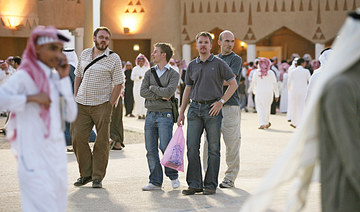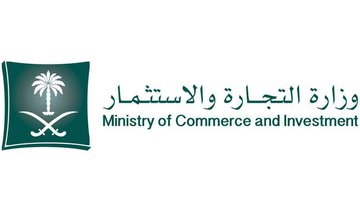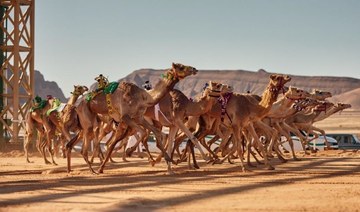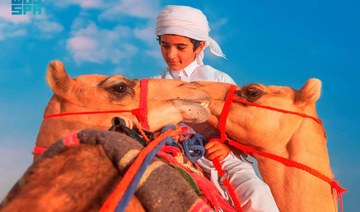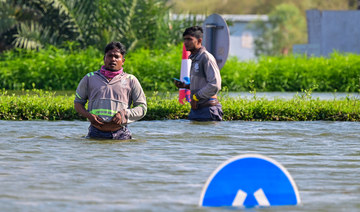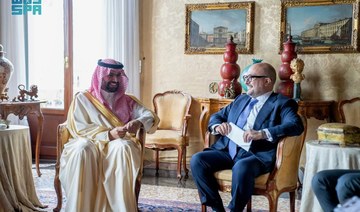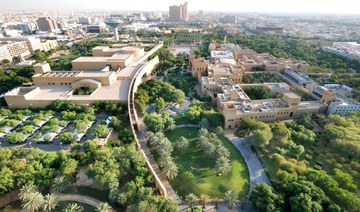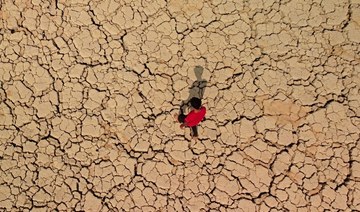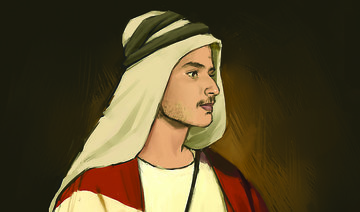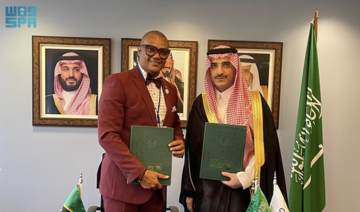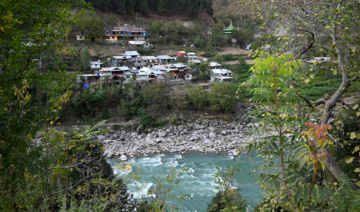JEDDAH: The Um Al-Qura newspaper, the official gazette of the Saudi government, has published new information concerning the laws and regulations of the Privileged Iqama, widely known as the Saudi “Green Card.” It also carried the conditions under which the Iqama can be canceled.
Following the announcement of the Saudi Cabinet’s approval of the Privileged Iqama residency permit, as previously reported by Arab News, the new information offers a further look at the Privileged Resident Permit (iqama) scheme.
The iqama was first proposed in 2016 by Crown Prince Mohammed bin Salman and was approved by the Cabinet last week. It will for the first time allow foreign nationals to work and live in Saudi Arabia without a sponsor.
The scheme will enable expatriates to permanently reside, own property and invest in the Kingdom. An authorized draft of the new Privileged Iqama system offers a number of benefits to highly skilled expatriates and owners of capital funds that will not require a Saudi sponsor.
A special committee has been given 90 days to determine regulations governing the mechanisms of the scheme, such as fees for applicants, which have not been yet determined by the authorities.
Fahad bin Juma, vice chairman of the Shoura Council Financial Committee said that eligibility for the Saudi Green Card will be determined by a number of bodies headed by the Ministry of Commerce and Investment, as reported by Al-Watan newspaper.
He also added that in order to be eligible, applicants must possess scientific or professional skills that are not abundantly available in the Kingdom, or they should be company owners who can invest in the country.
The holder of the Privileged Iqama will be deemed resident for the purpose of applying other statutory provisions, especially tax provisions, regardless of how much time he spends outside the Kingdom in the course of the year.
The applicant must be over 21 years of age, must have a valid passport, must not have a criminal record, and must provide a health report dated within 6 months of the application presenting proof that the applicant is free of infectious diseases. In the case of applications from within the Kingdom, the applicant must obtain a legal resident permit before applying.
The Privilege Iqama rights include possession of private means of transport and any other movable properties that an expat is allowed to acquire as per the Saudi law, employment in private sector establishments and transfer between them (this includes the beneficiary’s family members) except for occupations and jobs from which non-Saudi nationals are banned. The rights also include freedom to leave the Kingdom and return to it independently, use of the queues designated for Saudi nationals when entering and exiting the Kingdom through its ports, and doing business under the foreign investment system.
Under the system, two categories are provided to applicants, an extended iqama and temporary iqama subject to renewal.
Upon approval of the application, according to Article 5, the applicant must pay the fees specified by the designated authorities; the holder will be deemed resident for the purpose of applying other statutory requirements, especially the tax provisions, regardless of how much time he spends outside the Kingdom in the course of the year.
The Privileged Iqama does not entitle the holder to Saudi citizenship.
The holder of the Privileged Iqama, will enjoy several rights, including residence in Saudi Arabia with his family, the right to issue visitor’s visas for relatives as defined by the MOI regulations, the recruitment of domestic workers, the possession of property for residential, commercial and industrial purposes with the exclusion of Makkah, Madinah and border areas as per the regulations. The holder will also be able to utilize property in Makkah and Madinah for a period not exceeding 99 years.
The Ministries of Justice and Commerce and Investment shall establish the necessary mechanisms to ensure the beneficiary’s access to an instrument of utilization issued by the Notary Public. This right will be enforceable by transfer to others according to the rules set by the committee.
Saudi Arabia’s minister of Economy and Planning, Mohammad Al-Tuwaijri, said that the Privilege Iqama law approved by the Saudi Cabinet confirms that the Kingdom is continuing its development and reform plans in accordance with Vision 2030 to develop its economy and enhance the attractiveness of its investment environment.
The Privilege Iqama aims to make residents and expatriates an active part of the Saudi economy, promote consumption growth by increasing quality purchasing power and economic activity in various sectors, establish more small and medium enterprises, and generate jobs for Saudi citizens.
The Privileged Iqama can be canceled if the holder did not comply with the obligations stipulated in Article 7 of the law, waivered his residency, and/or passed away or was no longer eligible.
Several matters could lead to the cancelation of the Iqama, such as providing false information in the application, a conviction for a crime punishable by imprisonment for a period exceeding 60 days and/or a fine exceeding SR100,000, or a judicial decision to deport the holder from the Kingdom.
The cancelation or termination of the Privilege Iqama does not entail the transfer of the rights and benefits, obtained in accordance with Article 2 of the law, to the holder’s family. However, if a family member met the conditions of this law and its regulations, he may apply for the Privileged Iqama.
In the event of the cancelation or termination of the holder’s Iqama or any of his family members, the Privilege Iqama Center will, in coordination with the designated authorities, consider and remedy any consequences that may result therefrom in accordance with the law and its regulations.
Rights and benefits of the Saudi ‘Green Card’
Rights and benefits of the Saudi ‘Green Card’
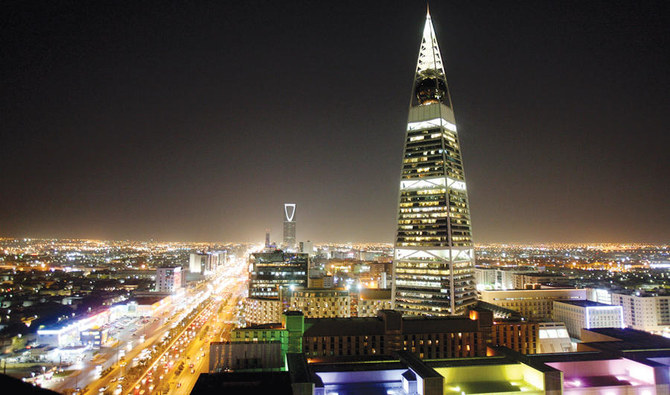
- New visa move will allow residents and expatriates to play a more active role in Saudi economy
Saudi Arabia takes part in 3rd annual international Camel Parade in Paris
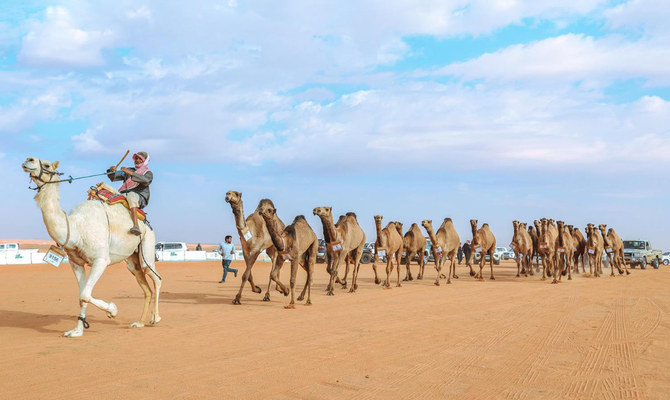
- This year’s event celebrates decision by the UN Food and Agriculture Organization to designate 2024 as International Year of Camelids
- Saudi representatives will highlight role of the Kingdom in promoting the value of camels as a cultural symbol associated with Saudi society since ancient times
RIYADH: Saudi Arabia is taking part in a special Camel Parade in France on Saturday, in celebration of the UN’s designation of 2024 as International Year of Camelids.
The event in Paris has been organized by the French Federation for the Development of Camelids in France and Europe, under the umbrella of the International Camel Organization, and is sponsored by the Saudi Ministry of Culture and the Kingdom’s Camel Club.
This is the third year in which the event has taken place. The event was first held in January 2019 and repeated in 2022.
The participants in the parade of camels, llamas, alpacas and other members of the camelid family of creatures are expected to include more than 50 representatives of camel-related organizations from more than 30 countries, along with camel breeders, government officials, others with an interest in the animals, and entertainers from various branches of the performing arts.
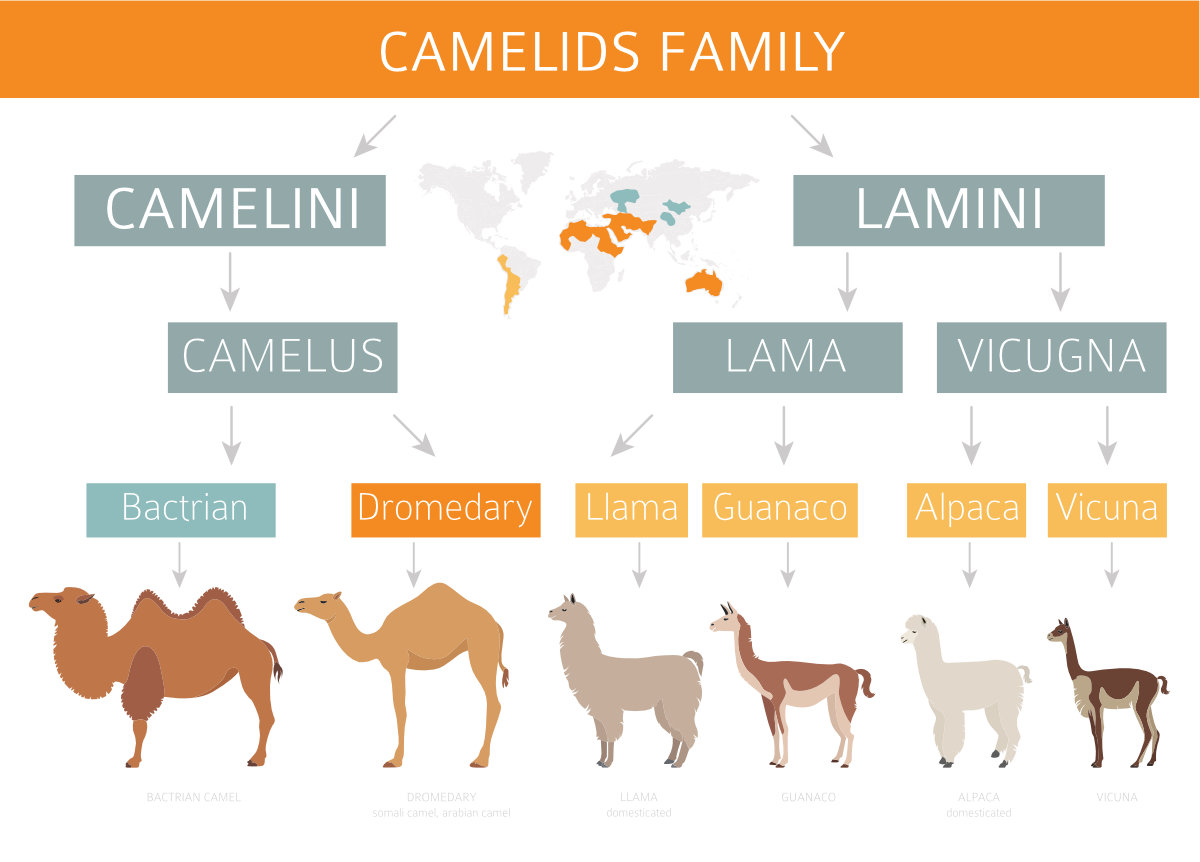
In addition to Saudi Arabia, the countries that will be represented include the US, the UAE, Qatar, Oman, Bahrain, Canada, India, Morocco, Tanzania, Peru, Algeria, the Czech Republic, Pakistan, Tunisia, Austria, Spain, Burundi, Senegal, the Democratic Republic of the Congo, Mauritania, France, Sudan, Chad, Angola, the UK and Uganda.
Saudi representatives will highlight the role of the Kingdom in promoting the value of camels as a cultural symbol that has been associated with Saudi society since ancient times and “still enjoys great prestige,” the Saudi Press Agency reported.
On Friday, the eve of the parade, public discussions took place at the Chateau de Janvry’s historical center about cultural heritage associated with camels around the world and the specific contributions by participating countries to the annual event in Paris.
The parade will be followed by a reception for invited guests, including representatives of the participating countries, international organizations, academia, research centers and the private sector, the SPA reported.
The UN Food and Agriculture Organization named 2024 as International Year of Camelids to honor and promote the sector and highlight the important role it plays in efforts to achieve food security and economic growth in many countries.
Saudi assistant defense minister holds talks with Pakistan’s top military officials in Islamabad
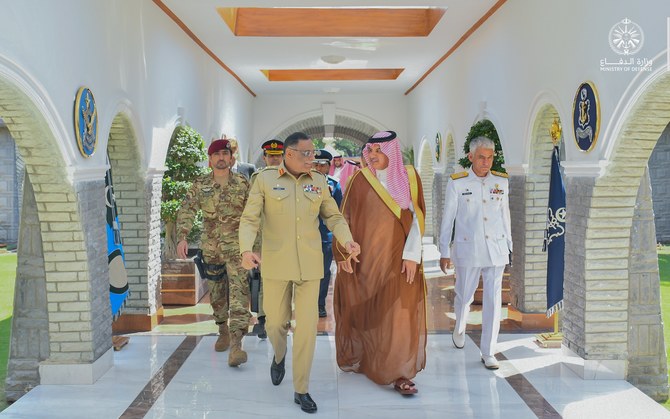
RIYADH: Saudi Arabia’s assistant minister of defense, Talal Al-Otaibi, on Friday held talks with top officials from the Pakistan Army during an official visit to Islamabad.
He reviewed relations between the two countries during meetings with the commander of the army, Gen. Syed Asim Munir, the head of the Joint Chiefs of Staff, Gen. Sahir Shamshad Mirza, and the chief of the general staff, Gen. Muhammad Avais Dastgir.
The Saudi-Pakistani Committee also met during Al-Otaibi’s visit. Its members discussed cooperation between the nations in the field of defense, including research and development, and the transfer and localization of technology, in line with the goals of Kingdom’s Vision 2030 development and diversification plan.
How the adoption of electric vehicles is driving Saudi Arabia’s green agenda
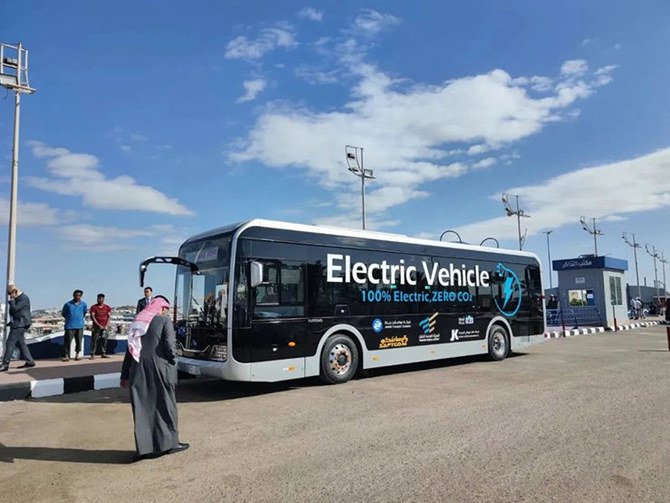
- Saudi Arabia’s Public Investment Fund wants to produce half a million electric vehicles by 2030
- The Kingdom has installed charging outlets in public areas in Diriyah to encourage EV ownership
RIYADH: Around the world, electric vehicles are already revolutionizing leisure, public transportation and logistics, shrinking the carbon footprint of travel, improving air quality and reducing pollution in the air, on land and in the sea.
As Saudi Arabia embarks on a range of environmental initiatives designed to address the challenges posed by climate change and foster sustainable economic development, EVs have become an important focus area.
The shift from traditional combustion engine vehicles to new electric models has accelerated worldwide as companies and consumers opt for greener modes of transport. Saudi Arabia is no exception.
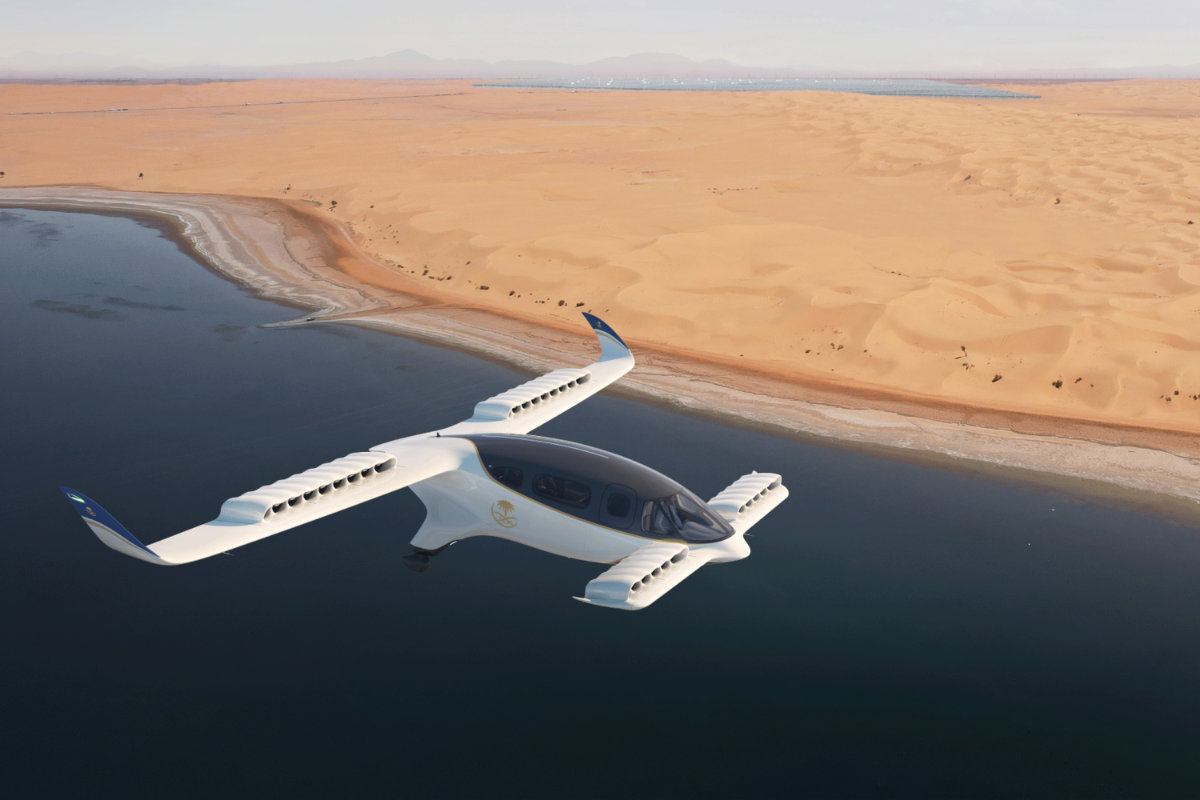
The transition from regular cars to electric vehicles in the Kingdom is flourishing. The EV trend has gone beyond personal vehicle ownership, with the proliferation of everything from e-scooters to electric buses.
There are even discussions around whether EV technology will soon be applied to aircraft and perhaps space travel.
Stephen Crolius, former climate adviser at the Clinton Foundation and current president of Carbon-Neutral Consulting, supports the idea of EV ownership due to its environmental benefits.
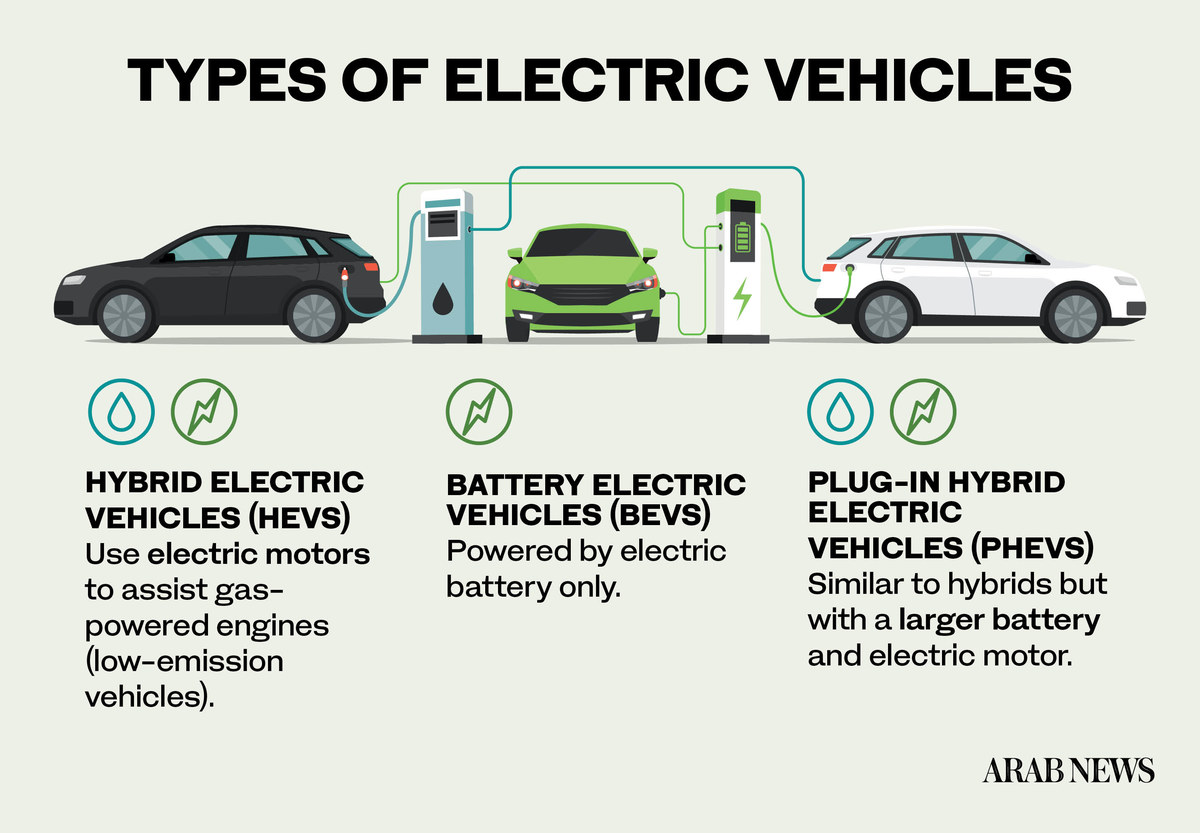
Although it might still be a challenge to educate the public in some societies about the benefits of transitioning to EVs, Crolius says the advantages outweigh the disadvantages.
“For mass transition to occur on any front, there has to be a set of circumstances that cause it to happen,” he told Arab News.
“Through government encouragement, we can continue to build volume (and) cause industries to mature, like, for example, the battery industry, which has done a lot of maturing over the last 15 years … the cost of batteries and the prices of batteries have come down to an extraordinary degree.
Opinion
This section contains relevant reference points, placed in (Opinion field)
“We are developing renewable generation for electricity. Are we developing fast enough to head off the climate crisis? I don’t know. But compared to new generations of technology getting rolled out, we are deploying a lot of renewable electricity generation, in historical terms, really fast.”
Companies such as CEER and Lucid, which are heavily funded by the Saudi Public Investment Fund, are at the forefront of driving growth in Saudi Arabia’s electric vehicle industry.
US electric car manufacturer Lucid signed a contract with the PIF two years ago to build a factory in the King Abdullah Economic City on the Red Sea. Today, PIF shares a little over half of the ownership of the group in the Kingdom, and aims to produce almost half a million EVs by 2030.
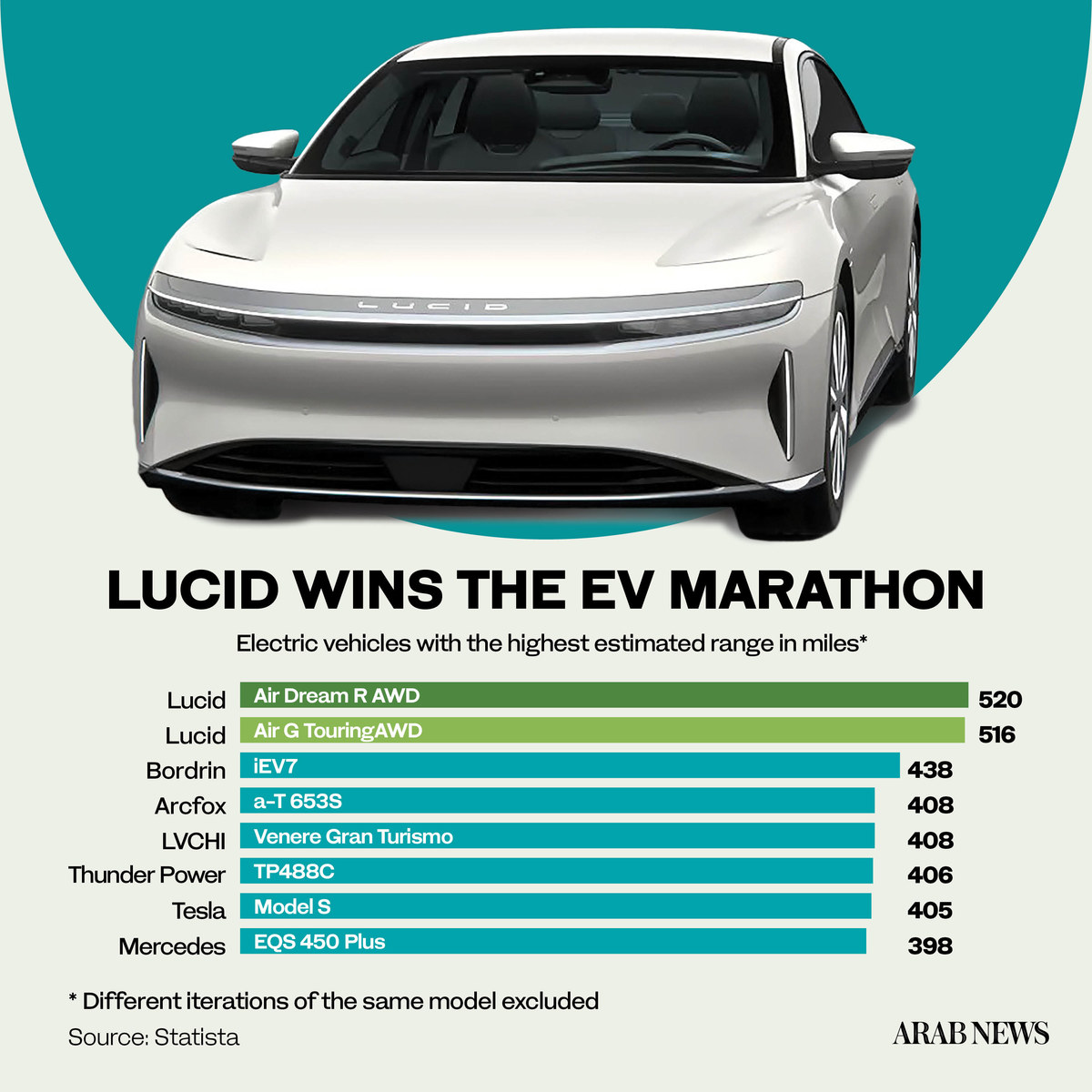
Since last year, the use of electric vehicles in the Kingdom has expanded to include electric buses as a sustainable alternative to traditional fossil fuel-powered vehicles.
Electric buses have zero emissions and therefore significantly reduce air pollution and greenhouse gases in urban areas, especially during the Hajj season, when pilgrims flock to the Kingdom and make use of its mass transit network.
An electric bus service connecting the airport to the Prophet’s Mosque in Madinah was launched by the region’s governor Prince Faisal bin Salman bin Abdulaziz during the last Hajj season.
DID YOUKNOW
• The Kingdom has invested at least $10 billion in US electric car manufacturer Lucid Motors.
• With 61% of shares, Saudi Arabia is the majority owner of Lucid Group through its Public Investment Fund.
• PIF aims to produce 500,000 EVs annually by 2030.
• In Riyadh, the EV share is targeted to increase by 30% in 2030.
The route connecting the two locations enabled high operational efficiency, with a bus able to travel 250 km on just a single charge.
Electric buses offer a variety of benefits, including reduced noise, improved energy efficiency and lower maintenance costs. In addition, they have a smaller carbon footprint, which is a crucial step toward sustainability.
Saudis committed to protecting the environment have also included EVs in their daily commute, with e-scooters now found in Riyadh and other cities. E-scooters provide an eco-friendly solution to local transport by cutting toxic emissions and lowering noise pollution.
Offering e-scooter services in various locations in Riyadh is a clear sign of the Kingdom’s eagerness to not only set regulations and promote electric vehicles, but also lead society in adopting a positive attitude toward sustainable living.
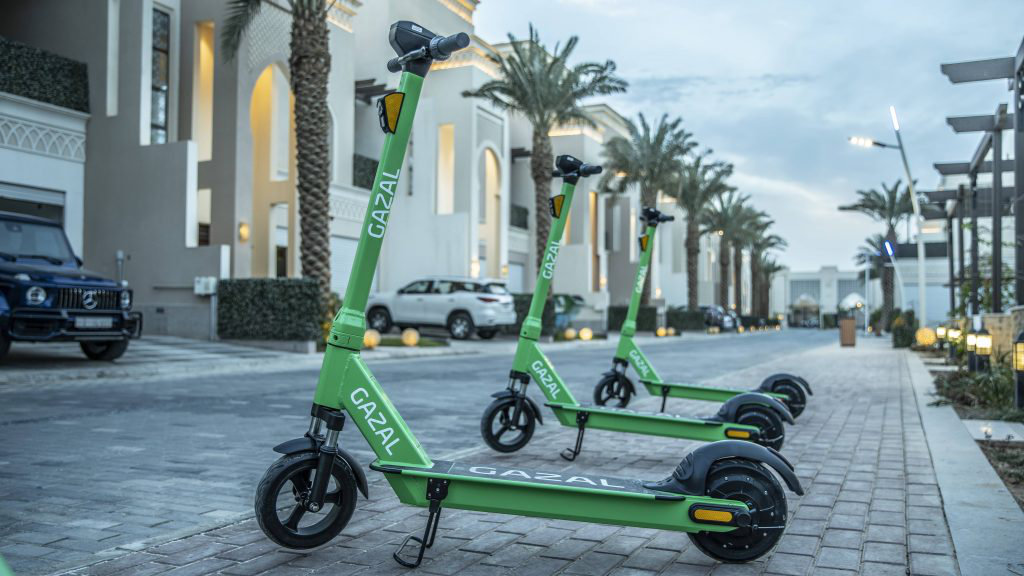
Furthermore, with advancements in battery technology and the development of charging infrastructure, electric vehicles are becoming a viable option for companies aiming to decarbonize their operations.
For example, in public areas in Diriyah such as Albujairi and At-Turaif, standard wall outlets are available for EV owners to charge their vehicles while enjoying a visit to the UNESCO World Heritage site.
As the aviation industry is one of the largest contributors to carbon emissions, the concept of electric aircraft may offer a promising solution to global decarbonization.
Three years ago, British automobile maker Rolls-Royce broke records when its “Spirit of Innovation” aircraft reached 628 km per hour, making it the world’s fastest all-electric vehicle.
At the time, Warren East, the company’s then-CEO, said that electric aircraft could make “jet zero” a reality and help decarbonize all forms of transport.
Compared to existing commercial aircraft, which rely on petroleum and synthetic fuel blends, electric planes produce less noise, have lower operating costs and emit significantly fewer greenhouse gases.
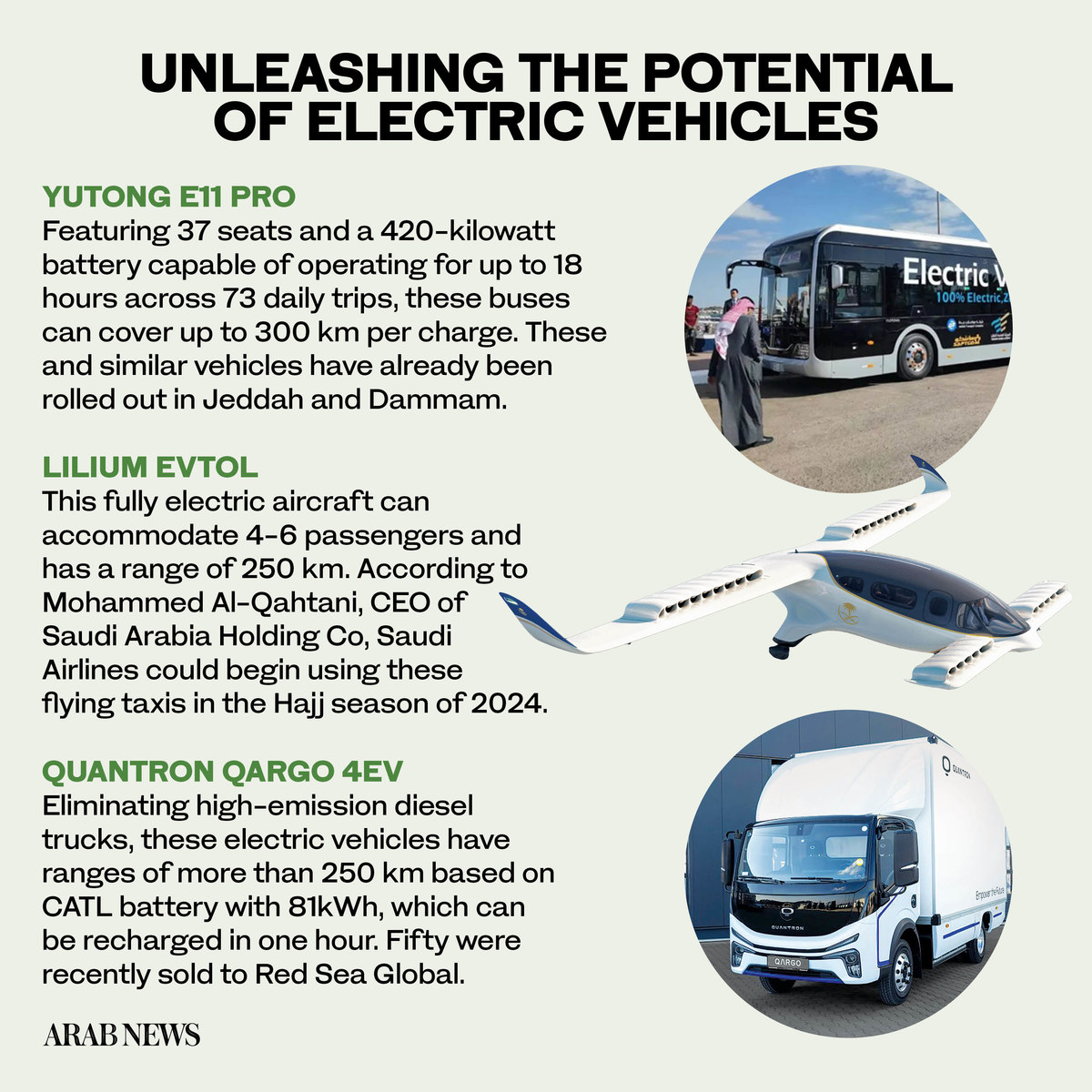
However, there are still several obstacles to the widespread adoption of electric aircraft — in particular the sheer expense of adapting the existing infrastructure needed to support their use.
Though governments and private companies worldwide could collaborate and build a comprehensive network of charging stations to meet growing demand, this may burden the economies of some countries.
Nevertheless, the growing importance of electric vehicles beyond cars, such as buses, electric scooters and airplanes, holds great promise for a decarbonized future.
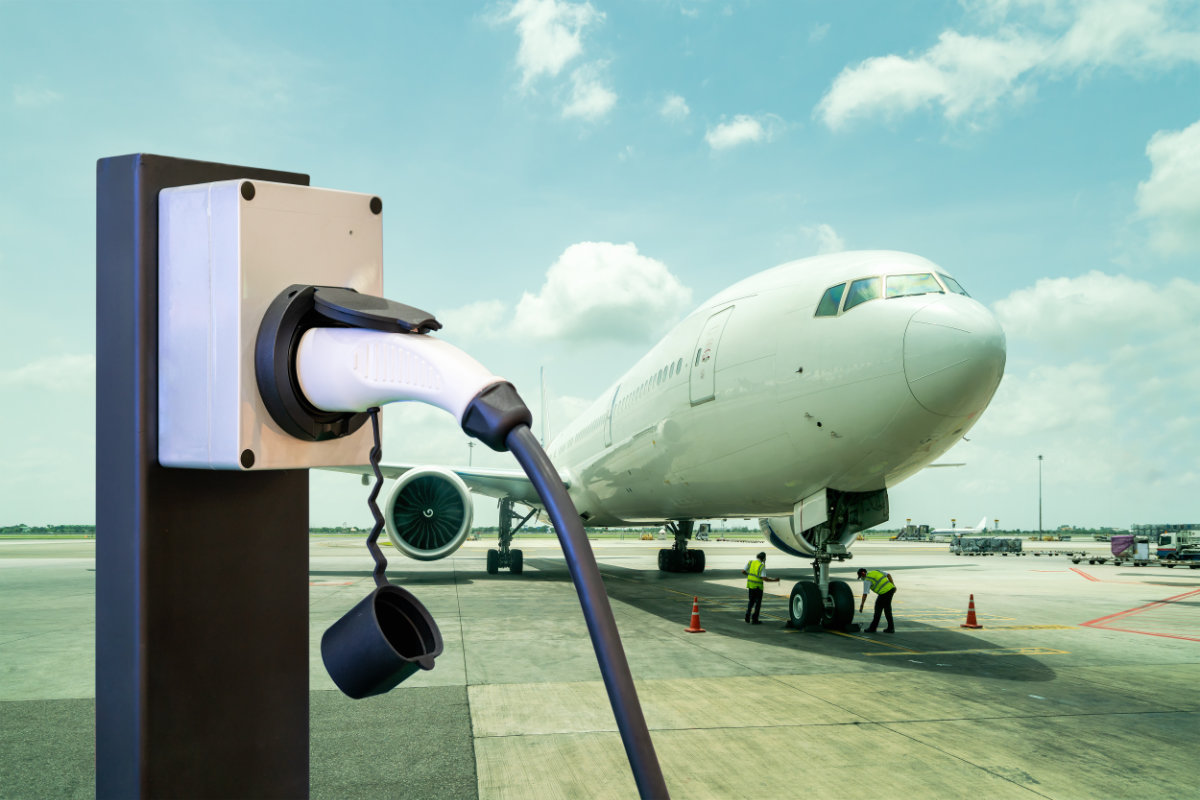
Utilizing alternative sources of energy in these areas can change the carbon emissions game for the better, fight air pollution, and pave the way for sustainable transport systems in the Kingdom and around the world.
To realize the full potential of electric vehicles, however, governments and businesses will first have to address challenges such as the provision of sufficient charging infrastructure as well as range limitations in battery technology.
Through continued innovation and investment, electric vehicles will play a key role in creating a greener and more sustainable future.
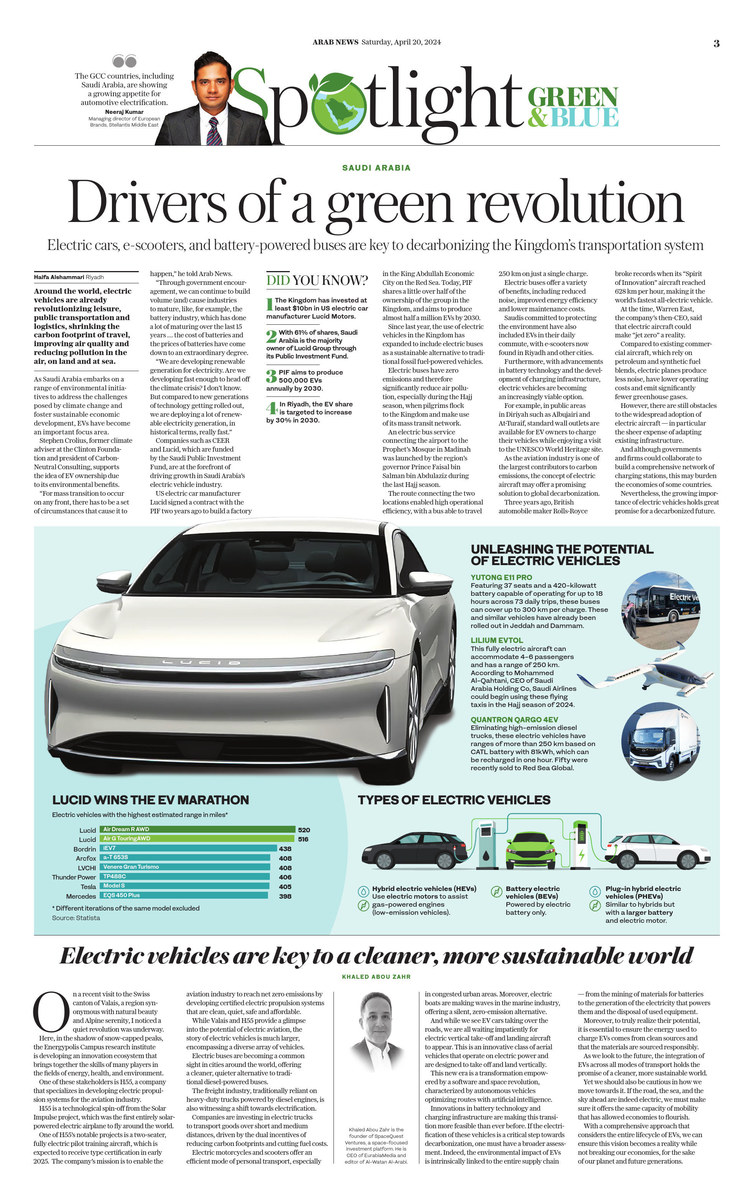
Art is ‘translating feelings,’ says 16-year-old Saudi artist
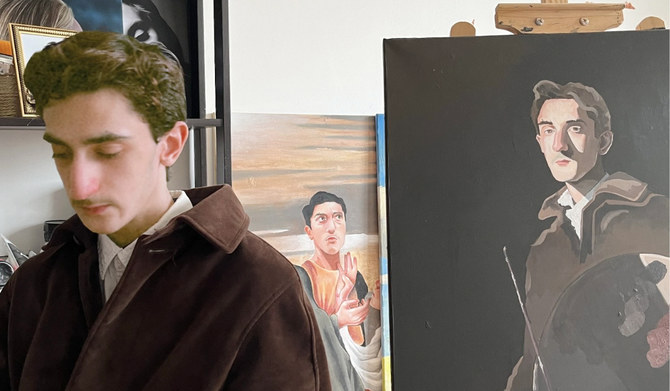
- Jawad Al-Omair has established himself as a painter, drawing inspiration from the beauty and pain surrounding him
RIYADH: While his classmates took part in sports activities, Saudi teenage artist Jawad Al-Omair daydreamed about the next time he would pick up a paintbrush or pencil to draw again.
At only 16 years of age, Al-Omair has established himself as an artist, drawing inspiration from the beauty and pain surrounding him.
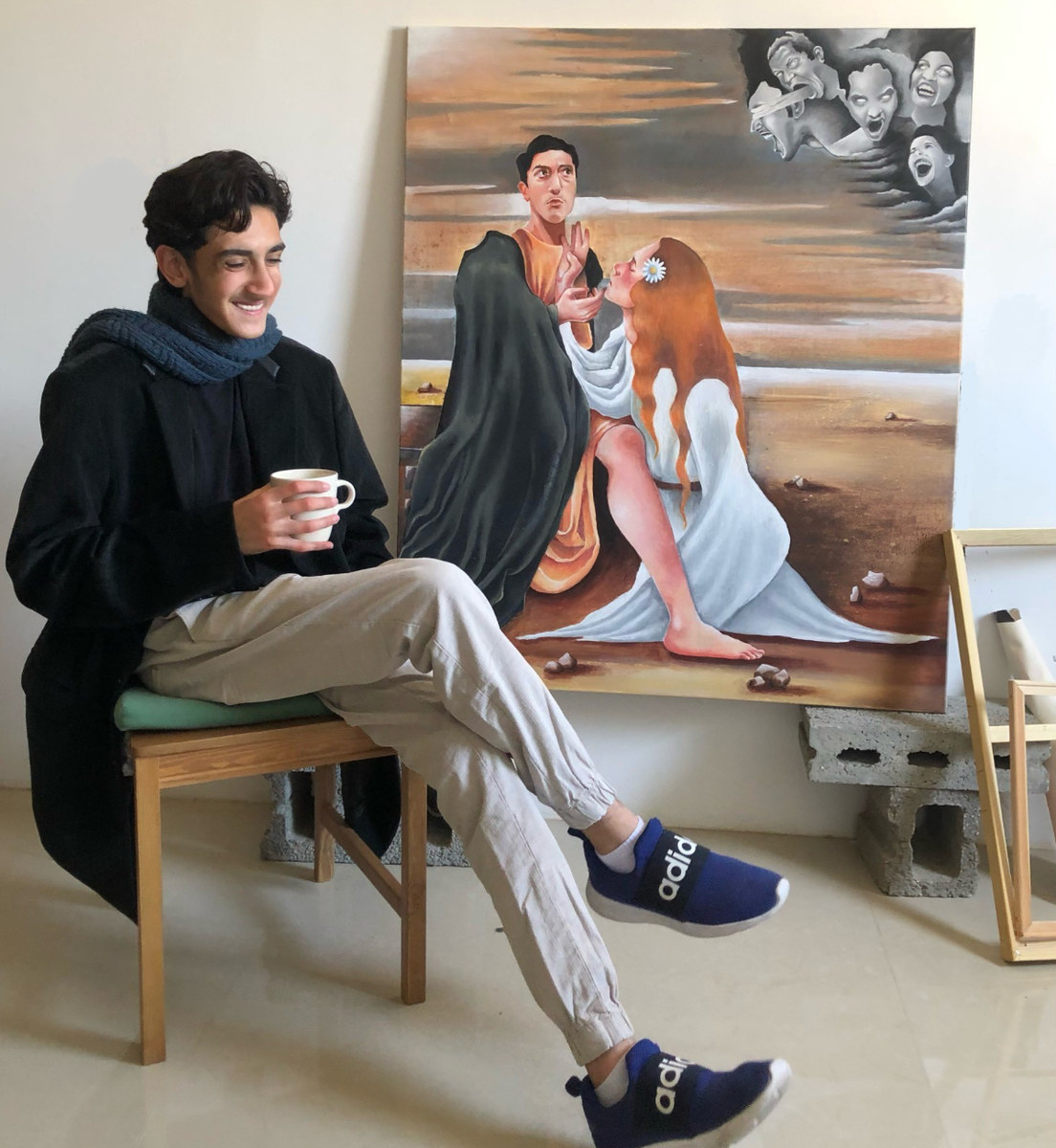
He told Arab News that his breakthrough moment came when he discovered his artistic abilities in the third grade.
“All the kids used to go to play. I always found myself opening my notebook and just drawing. I remember one day, I drew something at school, and when I got home, I showed it to everyone. I told myself, ‘I should do this more often.’”
HIGHLIGHT
Jawad Al-Omair views color as an arsenal to communicate emotion in his artworks.
He uses acrylic paint to portray his vivid ideas on canvas.
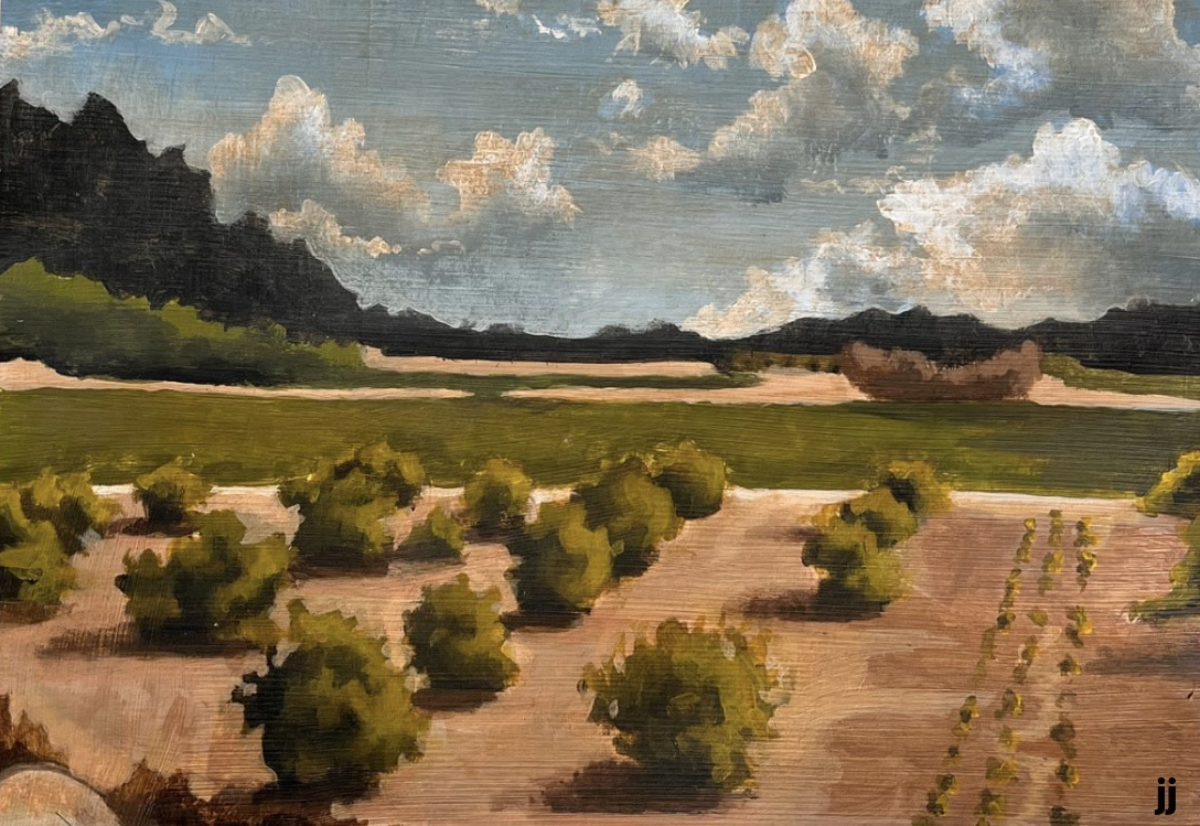
“With every painting I do, I usually have a vision of what the color palette is going to be and the composition, and most importantly what message and feeling I am trying to deliver through the painting.”
The young artist views color as an arsenal to communicate emotion in his artworks. “If I wanted to paint something that conveys the feeling of being lost, I would usually use cool toned colors like greys and blues.”

Al-Omair said that he noticed a dramatic change in his artistic abilities after being introduced to a group of local artists who taught him painting techniques to implement in his artworks.
“Dana Almasoud is one of my best friends who has helped me so much. Three years ago, I used to be a completely different artist. I used to be unable to draw small portraits, but she taught me how to. I can’t picture how my life would be if I had not met them,” he said.

In a recent artwork, Al-Omair painted a large-scale self-portrait inspired by the style of John Singer Sargent, an American artist renowned for his portrait paintings in the late 19th and early 20th centuries.
He described Sargent as one of his favorite artists. “If you see his self-portrait, It is similar to mine. I was looking at his artwork while I was painting so I could capture that same vibe.”
It took Al-Omair about 12 hours to complete the self-portrait, which emphasizes his prominent features.
“I get commented on my nose a lot, so I painted it in the center. I wanted to immortalize my 16-year-old self, because who knows what I will look like five years from now?”
The young artist aims to turn all sorts of experiences — even those of friends or family members — into art.
“How would life be if we did not have music or anything beautiful to look at? When you think of an artist, people usually imagine someone with a brush, but it is much bigger than that.
“Art is translating feelings with a certain skill. Movies taught humanity so much because you get to learn about people. Writing, songs and music are emotional things that we share. Art is one of the most important parts of life. Everyone has an artistic side to them that they may have not found yet,” he said.
Saudi development fund agrees $50m loan deal with St. Vincent and the Grenadines
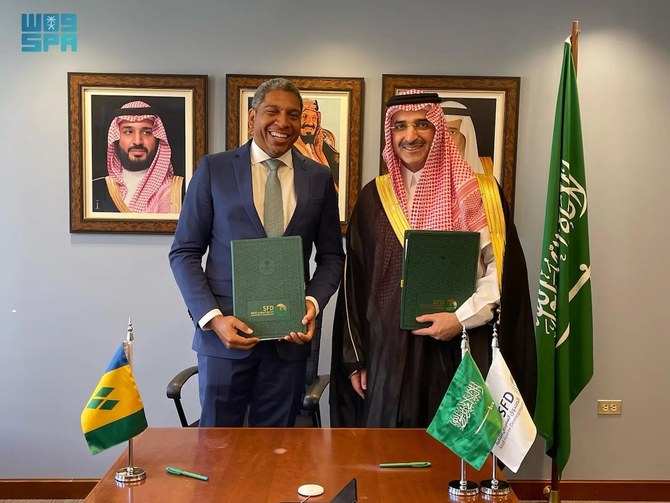
- Funding will help rebuild and repair facilities damaged by natural disasters in the Caribbean island nation
RIYADH: The Saudi Fund for Development signed a $50 million loan agreement with St. Vincent and the Grenadines on Friday to assist communities affected by natural disasters, Saudi Press Agency reported.
The deal was signed by SFD CEO Sultan Abdulrahman Al-Marshad and Camillo Gonsalves, finance minister of St. Vincent and the Grenadines, during the 2024 spring meetings of the World Bank and the International Monetary Fund in Washington.
According to the World Bank, the southern Caribbean nation faces a host of natural threats, including floods, hurricanes, droughts, landslides, and volcanic eruptions.
The agreement will fund a project to rebuild and repair buildings and facilities damaged by natural disasters in the island nation.
This initiative includes the restoration and construction of essential infrastructure, such as housing, healthcare, educational, and sports facilities, aimed at boosting their durability and resilience against future disasters and climate change impacts.
The project will also include establishing four healthcare centers, building primary and secondary schools, renovating government buildings, and restoring homes damaged by volcanic activity.
The loan is in line with the SFD’s commitment to supporting vulnerable communities around the globe.
Since its inception in 1975, the Saudi fund has financed over 800 development projects and programs worldwide, with total funding exceeding $20 billion.




